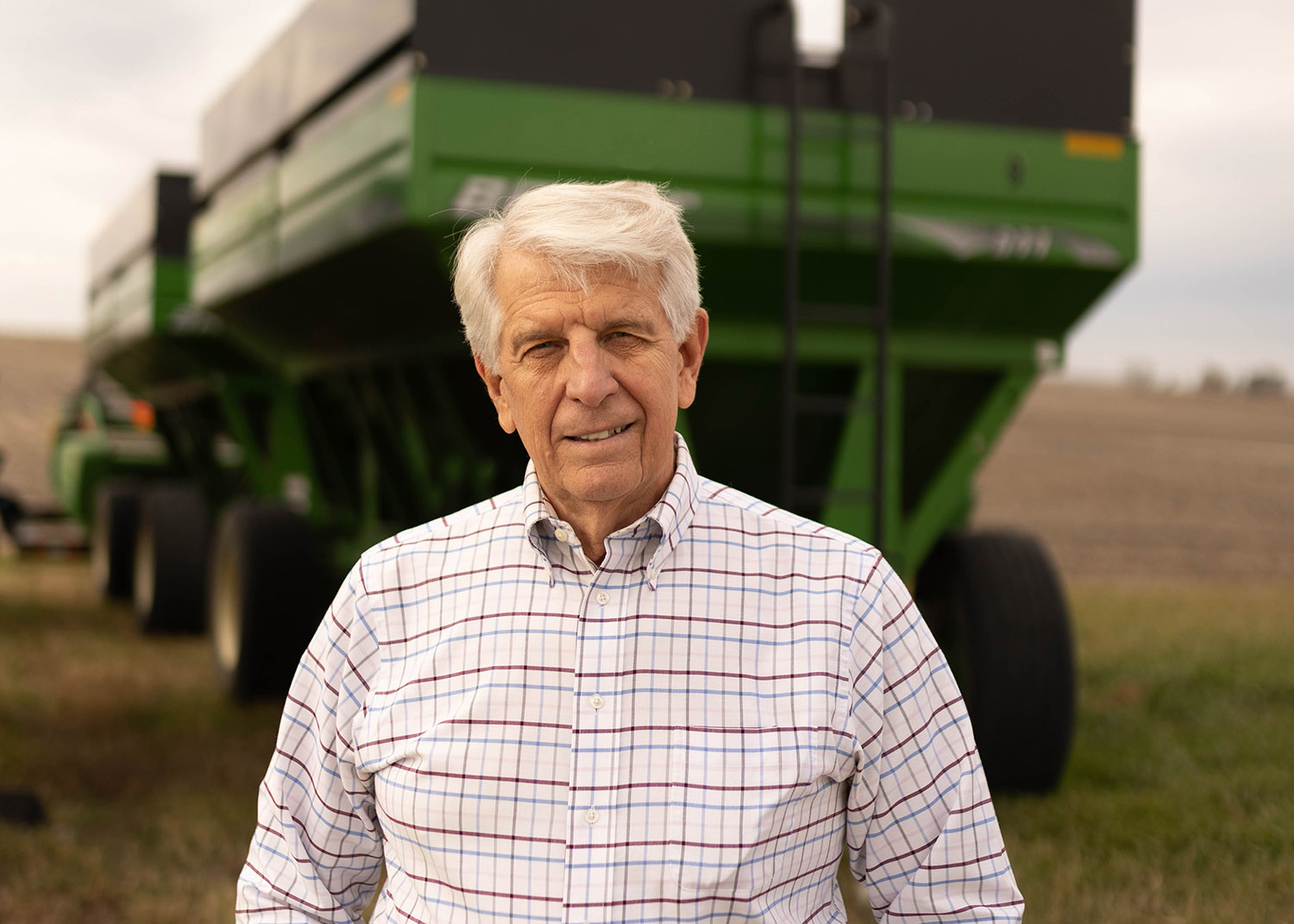
After his service in the U.S. Army, Don Latham returned to the Alexander area to farm with his wife and family. (Photo: Iowa Soybean Association)
A salute to service
December 14, 2021 | Bethany Baratta
Awards glitter the walls of Don Latham’s basement office on his farm near Alexander. His leadership in national organizations has collected accolades from his peers — all the while building the soybean industry through better seeds, marketing efforts and farmer buy-in.
Don grew up in the soybean world. His parents, Willard and Evelyn, started Latham Seeds before soybeans were a main crop in Iowa. The family worked with area farmers to clean oat seeds, later expanding their lines to include soybeans. Willard was one of the early members of the Iowa Soybean Association and a founding director of the Iowa Soybean Promotion Board (ISPB).
While attending Iowa State University (ISU), Don studied agronomy and meteorology. Though off the farm, he couldn’t leave seeds altogether, he worked in the seed science lab at ISU.
Service to country
During his sophomore year at ISU in 1966, the U.S. Army actively drafted students out of college to go into the service and Vietnam. The Army had developed a two-year ROTC program, which would pay him $100 per month, enough to pay for college.

Don committed to being a pilot in the Army, a good fit for the farmer who always wanted to fly. Flight school proved that Don was good at it, too. He was ranked second in his class of 120. His training in meteorology, flight training and flight rules, earned him an instrument rating. This allowed him to fly helicopters in Vietnam and help train aspiring military pilots.
Don served in the U.S. Army from 1969 until 1973, including a year in Vietnam with an Assault Helicopter Company. He says his service to the country readied him for future leadership opportunities.
“In the military, you learn discipline, teamwork, and that there’s a bigger cause than yourself,” Latham says. “I’ve applied the leadership training I received in the Army everywhere else I’ve gone in life.”
Soy service
Don attended local and national soybean meetings with his parents, so when his dad’s term on the ISPB ended in 1985, Don successfully ran to fill his position on the board.
As chairman of the ISPB in the 1980s, Don and other state checkoff leaders were interested in — and invested in — the future of the checkoff. At the time, the national checkoff was voluntary; each state board voted how much money they wanted to invest. They set a meeting to discuss the direction of the national checkoff.
“We were after uniform funding; we wanted all farmers to benefit and all farmers to pay into it equally,” he says.
A subsequent study suggested the creation of a board to manage the collection of national checkoff funds. Thus, the United Soybean Board (USB) was created. Don served as a founding director and later as chairman.
Checkoff investments into production and marketing efforts have paid off, Don notes.
“When we formed the United Soybean Board in 1991, the U.S. soybean crop was 1.7 million bushels. In 2020, the U.S. soybean yield was more than 4 billion,” he says. “That didn’t just happen. That 2.5-times expansion was because of checkoff-funded research at the state and national levels.”
Checkoff investments created markets, too. Before 1996, China was a net exporter of soybeans. In the 2021-2022 marketing year, China is expected to import 101 million metric tons (3.7 billion bushels), according to the U.S. Department of Agriculture.
“The soybean checkoff created that demand,” Don says.
The checkoff also created additional uses for soybeans. Through connections in Asia, a subcommittee Don was a part of coined the term ‘aquaculture’ to acknowledge farmers raising fish. Soybean meal has become a large piece of the aquaculture diet.
In 1995, there wasn’t a single pound of soybean meal used to feed fish, he notes. Today, more than 500 million bushels of soybeans are used in aquaculture worldwide.
“It’s incredible,” Don says. “What USB provided was a platform for people who had the imagination to come to us with funding proposals.”
USB presented Don with the Outstanding Achievement Award for his contributions to the industry.
Through his many visits to customers worldwide — he’s made more than 40 trips to Asia — he’s learned of markets then untapped by the United States. In his own business, Latham Farms LLC, Don grew food-grade soybeans for tofu makers in Asia. He can still picture the tofu shop set up in a space no larger than a garage. In the back of the shop: a container with his Latham 323 variety beans.
Don’s no longer raising food-grade soybeans. Ownership of the family’s business was transferred to Don’s nephew John and his wife Shannon in 2009. However, the 75-year-old is still growing soybeans for Latham Hi-Tech Seeds.
As history has proven, neither college nor military service can remove him entirely from the industry. His roots run deep.
Back